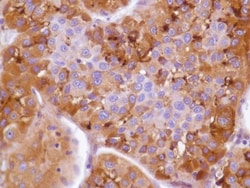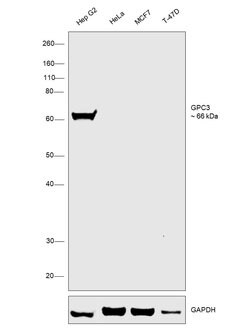Learn More
Invitrogen™ Glypican 3 Monoclonal Antibody (SP86)
Rabbit Monoclonal Antibody
Supplier: Invitrogen™ MA516368
Description
Heat-mediated antigen retrieval is recommended prior to staining, using a 10mM citrate buffer, pH 6.0, for 10 minutes followed by cooling at room temperature for 20 min. Following antigen retrieval, incubate samples with primary antibody for 30 min at room temperature. A suggested positive control is placenta or liver carcinoma.
GPC3 is a cell surface proteoglycan that bears heparan sulfate. This protein may be involved in the suppression/modulation of growth in the predominantly mesodermal tissues and organs, and may play a role in the modulation of IGF2 interactions with its receptor and thereby modulate its function. Members of the glypican-related integral membrane proteoglycan family contain a core protein anchored to the cytoplasmic membrane via a glycosyl phosphatidylinositol (GPI) linkage. These proteins may play a role in the control of cell division, growth regulation, and tumor predisposition. Deletion mutations in GPC3 are the cause of Simpson-Golabi-Behmel syndrome (SGBS), also known as Simpson dysmorphia syndrome (SDYS). SGBS is a condition characterized by pre- and postnatal overgrowth (gigantism) with visceral and skeletal anomalies.
Specifications
| Glypican 3 | |
| Monoclonal | |
| 0.466 mg/mL | |
| PBS with 1% BSA and 0.1% sodium azide; pH 7.2 | |
| P51654 | |
| GPC3 | |
| Synthetic peptide derived from C-terminus of human glypican-3 protein. | |
| 500 μL | |
| Primary | |
| Human | |
| Antibody | |
| IgG |
| Flow Cytometry, Immunohistochemistry (Paraffin), Western Blot, Immunocytochemistry | |
| SP86 | |
| Unconjugated | |
| GPC3 | |
| defective in Simpson-Golabi-Behmel overgrowth syndrome; DGSX; glypican 3; glypican proteoglycan 3; glypican-3; Glypican-3 alpha subunit; Glypican-3 beta subunit; Gpc3; GTR22; GTR2-2; heparan sulphate proteoglycan; intestinal protein OCI-5; MXR7; OCI5; OCI-5; proteoglycan GPC3; SDYS; secreted glypican-3; SGB; SGBS; SGBS1 | |
| Rabbit | |
| Protein A | |
| RUO | |
| 2719 | |
| -20°C, Avoid Freeze/Thaw Cycles | |
| Liquid |
Your input is important to us. Please complete this form to provide feedback related to the content on this product.

